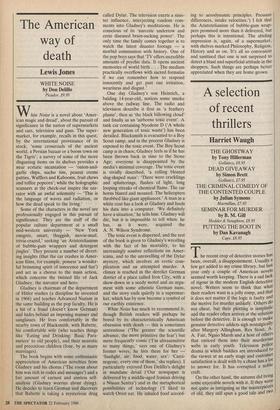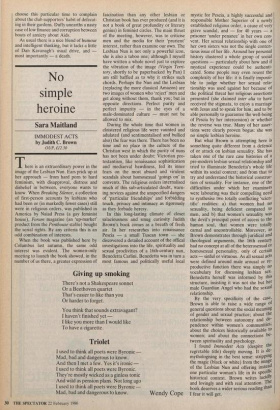A selection of recent thrillers
Harriet Waugh
THE GHOSTWAY by Tony Hillerman
Gollancz, f8.95
DEAD GIVEAWAY by Simon Brett
Gollancz, f7.95
THE CRIMINAL COMEDY OF THE CONTENTED COUPLE by Julian Symons
Macmillan, f7.95
SEMINAR FOR MURDER by B. M. Gill
Hodder & Stoughton, f8.95
PUTTING THE BOOT IN by Dan Kavanagh
Cape, £8.95
The recent crop of detective stories has been, overall, a disappointment. Usually a few get added to my crime library, but last year only a couple of American novels seemed worth keeping. There is a sad lack of rigour in the modern English detective novel. Writers seem to think that what their readers want is a jolly romp, and that it does not matter if the logic is faulty and the motive for murder unlikely. Others do not cheat, but their plotting is simplistic and the reader often arrives at the solution before the detective. It is enough to make genuine detective addicts sigh nostalgically after Margery Allingham, Rex Stout, A. A. Fair, Ngaio Marsh and a host of others that enticed them into their murderous webs in early youth. Television police drama in which baddies are introduced to the viewer at an early stage and customer satisfaction is dealt with by a chase has a lot to answer for. It has corrupted a noble craft.
On the other hand, the autumn did bring some enjoyable novels with it. If they were not quite as intriguing as the masterpieces of old, they still spun a good tale and two or three delivered a satisfactory ending as well. The best of these, Tony Hillerman's The Ghostway succeeds in telling a racy, complicated story with an excellent twist to it. Tony Hillerman does take the detective craft seriously and — a bonus — he has a particularly engaging hero. Jim Chee, who operates mainly on the Navajo reservation, is a Red Indian police officer. In this novel his knowledge of tribal custom leads him to question why and how a detribalised Nava- jo Indian comes to die, with unwashed hair, of gunshot wounds, in the hogan of his traditionally minded grandfather. The Navajo hoodlum had been shot by a white gangster in a Navajo car wash-o-mat; but why had he only partly been prepared for death by his grandfather, who himself has gone missing? Chee is on the trail of a white businessman about to stand trial as a drugs baron in Los Angeles and a missing schoolgirl who is scheduled for murder. Chee gets things dangerously wrong, even as he gets a good many things right. The solution is ingenious and the plotting ex- citing.
Simon Brett's solutions do not always bear scrutiny, but Dead Giveaway's is better than usual. Added to this is the pleasure of renewing one's acquaintance With Charles Paris, his alcoholic, failed- actor amateur detective. All the Charles Paris novels are irradiated by humour and this one is no exception. Here he appears as an unknown face in a particularly banal television game in which the contestants
have to guess the occupations of the different unknown faces. As the pilot programme is being filmed, the unpleasant presenter drinks a glass of poisoned water on camera. A continuity girl with a roman- tic grudge against the deceased is arrested, but Charles knows she is innocent because, on discovering that the presenter's glass contained gin, he himself had drunk from it an hour before the programme was filmed (but after the continuity girl could have tampered with it.) He therefore feels that he had better unearth the real murderer. As Charles follows up dead-end clue after dead-end clue, considerable fun is had at the expense of television executives and personnel, as well as stars, celebrities and ambitious quiz-game competitors.
The Criminal Comedy of the Contented Couple is also a satire, this time of middle- class urban manners. But it is decidedly chillier and less kind than Simon Brett's brand. The greater part of the novel is spent laying the scene for murder. Gossip surrounds a happy, handsome young cou- ple called Derek and Sandy Crowley. Poison pen letters accuse Derek, an ambi- tious travel agent, of having an affair with the German siren wife of his brutish partner. The unfolding drama is mostly seen through the eyes of Derek's childhood friend Jason, a womanish, small-town in- tellectual. There are three murders and the solution is pleasantly bizarre and darkly comic.
Seminar for Murder has a very tradition-
al and enjoyable setting. Detective Chief Inspector Tom Maybridge is invited to address a crime-writers' club and takes a certain smug satisfaction in pointing out, none too tactfully, to the assembled writers how amateurishly they view murder. His smugness turns to embarrassed horror, however, when on the following morning the unpleasantly feline president of the club is found in bed with a meat skewer in his neck. Stuck to the headrest a notice reads, 'Fault this murder, Detective Chief Inspector Maybridge, if you can.' Things become more complicated when it turns out that the skewer was not the murder weapon. The ending is a little disappoint- ing because the conclusion is not arrived at through logical deduction but through an accident of fate. And the satisfaction of unmasking the criminal is lessened by the fact that it turns out to be a minor character. However, there are some nice twists, and it is intelligently plotted.
Dan Kavanagh cheats in a different way in Putting the Boot In. Nobody gets killed. People get maimed instead, which is not at all the same thing, and much less satisfac- tory. Duffy, the homosexual hero, investi- gates some strange goings-on in a football club. The manager thinks somebody wishes to destroy the ailing club's chances in league football. Its chief player has his achilles tendon kicked outside a nightclub while another player, black and a solid citizen, is accused of rape. Political hooli- gans invade the terraces and local residents choose this particular time to complain about the club supporters' habit of defecat- ing in their gardens. Duffy unearths a nasty case of low finance and corruption between bouts of anxiety about Aids.
As usual there is a nice blend of humour and intelligent thinking, but it lacks a little of Dan Kavanagh's usual drive, and most importantly — a death.
















































 Previous page
Previous page